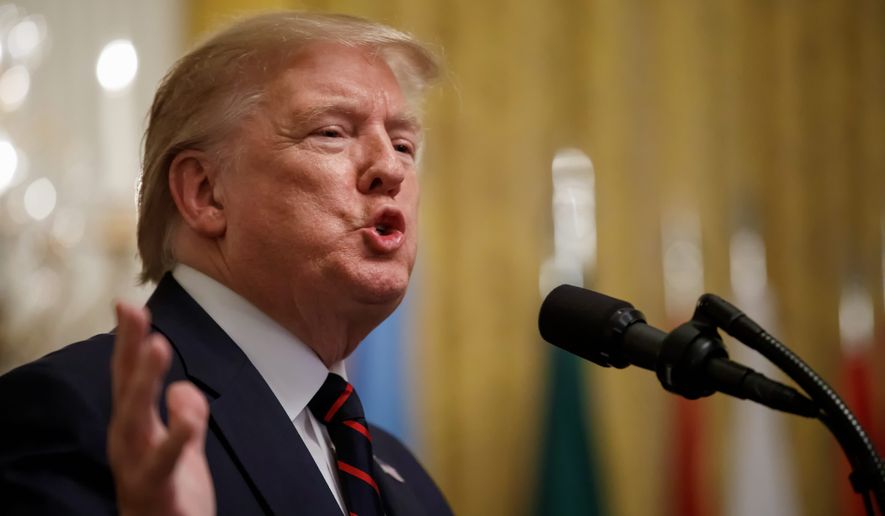President Trump and his allies are deploying a new favorite word — “secondhand” — as they attempt to discredit a government official who blew the whistle on White House interactions with Ukraine, hoping the public will view Democrats’ impeachment inquiry as a hasty mission built on hearsay.
Mr. Trump says the whistleblower is acting out of political animus and cannot be trusted, likening it to the Russia “hoax” that relied on a dubious dossier and so-called haters who are out to delegitimize him.
The whistleblower wrote up “secondhand information that proved to be so inaccurate that there may not have even been somebody else, a leaker or spy, feeding it to him or her? A partisan operative?” Mr. Trump tweeted Friday, kicking off a weekend of attacks on Democrats looking to impeach him over his interactions with Ukrainian President Volodymyr Zelensky.
Although the whistleblower’s identity is unknown to the public, a New York Times report identified the person as a man who works for the CIA who had been detailed to the White House for a time. In the complaint, the whistleblower does admit that the information is largely secondhand and that multiple officials supplied the information.
Capitol Hill Republicans, in language mimicking Mr. Trump’s, are seizing on that admission as they attack Democrats pursuing impeachment.
They say they’re amazed that Democrats are moving to oust the president based on what they’ve characterized as an interagency game of telephone — rather than firm evidence of an alleged “quid pro quo” involving $250 million in military aid to Ukraine and information about a political opponent.
“I can’t believe we’re talking about impeaching the president based on an accusation based on hearsay,” Sen. Lindsey Graham, South Carolina Republican, told CBS’ “Face the Nation.”
Rep. Jim Jordan, Ohio Republican, said the House Oversight Committee looks at two things when it assesses whistleblower accounts.
“First, did they have firsthand knowledge? And, second, what is their motivation? Was there some kind of bias? This guy has problems on both counts,” Mr. Jordan told CNN’s “State of the Union.”
Yet Democrats say they’re on solid ground.
They cite a transcript of Mr. Trump’s July 25 call, available for all to see, in which Mr. Trump asks Mr. Zelensky to “do us a favor” and look into what became of Democratic National Committee servers that were hacked in 2016.
The president also asked Mr. Zelensky to look into former Vice President Joseph R. Biden, under the theory he called for a Ukrainian prosecutor’s ouster in 2016 to help his son Hunter, who had business ties in Ukraine.
Mr. Trump’s decision to raise a political opponent in the conversation is a key part of the whistleblower’s complaint, which accurately highlights three main parts of the Trump-Zelensky call.
Jim Manley, a Democratic strategist who served as a spokesman to former Sen. Harry Reid, said Democrats will have an easier time leveraging this narrative than the Russian-meddling saga, which focused on the mysterious work of Robert Mueller’s prosecutors behind closed doors.
“The key difference is that what we are dealing with now is much easier to understand than the results of the Mueller investigation,” he said. “After all, [Mr. Trump] has admitted to so much already. Support for impeachment is already beginning to tick up.”
Rep. Hakeem Jeffries, New York Democrat, told CNN that Mr. Trump “has been caught red-handed trying to solicit foreign interference in the 2020 election by pressuring a foreign leader to target Joe Biden, an American citizen, for political gain.”
Joseph Maguire, the acting director of national intelligence, told Congress that the whistleblower “did the right thing” and followed the law.
Mr. Trump clearly disagrees, though, and hasn’t been shy about saying so. He says the whistleblower was too far removed from the action, spoiling Exhibit A in the Democrats’ zeal to impeach him.
“The ’whistleblower’ had NO direct knowledge of the call AND he is in favor of one of the corrupt 2020 Democrats,” Mr. Trump told supporters in a fundraising email. “Total political bias!”
• Tom Howell Jr. can be reached at thowell@washingtontimes.com.




Please read our comment policy before commenting.